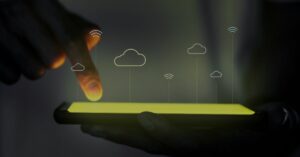In today’s fast-paced world, prioritizing mental well-being has become more crucial than ever. In fact, do you know nearly 1 in 5 adults in the United States experiences mental illness in a given year? Fortunately, the tides are turning. Gone are the days when mental health discussions were shrouded in stigma.
Today, a wave of innovative technology is emerging, specifically designed to address and improve mental health accessibility and treatment. This rise in mental health tech is not unknown. A staggering 64% of individuals living with mental illness report that technology has improved their overall mental health, highlighting the potential for a positive impact.
This blog delves into the exciting advancements in mental health tech along with a few emerging trends dominating mental healthcare. We’ll explore how these tools are transforming the landscape of mental healthcare, making it more approachable, personalized, and effective. From AI-powered diagnostics to immersive virtual reality therapy, discover how technology is poised to revolutionize the way we address mental health concerns.
AI-powered Diagnostics: Enhancing Precision and Timely Intervention
Innovative Algorithms: The landscape of AI in mental health diagnostics is evolving rapidly beyond mere pattern recognition. Deep learning algorithms are now undergoing training on extensive datasets encompassing patient records, brain scans, and anonymized social media interactions. This multifaceted approach enables the discernment of subtle linguistic cues and behavioral patterns indicative of early signs of mental health conditions such as depression or anxiety.
Risk Assessment: Utilizing AI, comprehensive analyses of patients’ medical histories, social determinants of health, and genetic predispositions are now feasible, allowing for accurate predictions of their susceptibility to specific mental health disorders. This predictive capability empowers healthcare professionals to initiate proactive interventions and preventive measures, potentially mitigating the severity of future episodes.
Tailored Treatment Strategies: AI-driven insights facilitate the customization of treatment plans to cater to the unique needs of individual patients. By analyzing data pertaining to individual responses to various therapeutic modalities, AI can offer recommendations for the most effective course of action, thereby optimizing treatment outcomes.

Tele-psychiatry & Virtual Care: Expanding Access and Reducing Stigma
Telehealth Innovations: Secure video conferencing platforms, augmented with advanced features such as mood tracking and journaling tools, are becoming increasingly prevalent. This technological advancement enables individuals residing in remote areas or facing mobility constraints to access qualified mental health professionals, transcending geographical barriers.
Mitigation of Stigma: Virtual consultations afford individuals the convenience and anonymity conducive to seeking help without fear of social stigma. Consequently, the utilization of telepsychiatry is anticipated to significantly increase the number of individuals receiving mental healthcare.
Integration with Wearable Technology: The integration of telehealth platforms with wearable devices is gaining momentum, enabling the real-time transmission of physiological data to therapists and fostering a comprehensive understanding of a patient’s condition, facilitating data-driven treatment decisions.
AR & VR for Mental Health: Redefining Therapeutic Modalities
With VR solutions becoming cheaper, more therapies are now reaching ordinary patients. Research suggests that virtual reality tools can successfully treat anxiety, phobias, and post-traumatic stress disorder, among other conditions.
Exposure Therapy in VR: Immersive VR environments facilitate exposure therapy by simulating scenarios that expose patients to their phobias in a controlled and safe setting. This method is particularly effective for treating conditions such as arachnophobia and acrophobia.
Cognitive Behavioral Therapy (CBT) via AR: AR overlays therapeutic elements onto the real world, providing real-time prompts and coping mechanisms to individuals grappling with social anxiety during social interactions.
Mindfulness Training in VR: Serene VR environments offer guided meditations and relaxation techniques, fostering mindfulness and stress reduction.
Brain Stimulation: Pioneering New Treatment Avenues
Transcranial Magnetic Stimulation (TMS): TMS, a non-invasive procedure involving the application of brief magnetic pulses to specific brain regions, has emerged as a promising intervention for major depressive disorder, particularly in cases resistant to conventional medication.
Transcranial Direct Current Stimulation (tDCS): tDCS employs weak electrical currents to stimulate targeted brain regions and exhibits potential in the treatment of various mental health disorders, including anxiety and obsessive-compulsive disorder (OCD).
Closed-Loop Neurostimulation: This cutting-edge technology entails the real-time monitoring of brain activity using sensors, with subsequent automatic adjustments to stimulation parameters based on monitored brainwaves. This dynamic approach promises a personalized therapeutic experience.
Wearable Monitoring: Insights into Mental Wellbeing
Tracking mental health symptoms manually is time-consuming and inefficient. You fill out a paper form on your first therapist visit and report any new signs at each in-person appointment. Providers record those symptoms to an electronic health record, which likely isn’t optimized for data analysis. In contrast, online symptom tracking prompts patients to share data daily. Having mental health tech with an AI algorithm analyzes that data to identify patterns and alert providers of warning signs in real time.
Advanced Sensor Technology: Contemporary smartwatches and fitness trackers incorporate sophisticated sensors capable of monitoring not only heart rate and activity levels but also physiological markers like blood oxygen saturation and electrodermal activity.
Mood Assessment: By analyzing fluctuations in physiological data, wearable devices hold the potential to detect changes in mood and emotional states, offering valuable insights for both patients and therapists in tracking progress and identifying triggers.
Sleep Quality Evaluation: Wearable data on sleep patterns provides therapists with invaluable insights into a patient’s overall well-being, facilitating the recommendation of targeted sleep hygiene interventions.

Current Trends in Mental Health Treatment
The Rise of Self-Management Apps
The rise of self-management apps has profoundly impacted mental health treatment, signaling a shift towards personalized care. These dynamic companions go beyond tracking, empowering users to manage their mental wellness journey. With intuitive interfaces, users can schedule medications, combat anxiety, and foster mindfulness. Leveraging advanced software and wearables, users gain insights into physiological markers, deepening their understanding of well-being.
Gamified Skill Training for Cognitive Empowerment
Innovative skill-training apps have emerged as catalysts for cognitive empowerment, embracing gamification to impart vital coping mechanisms. Gone are the days of passive learning; these immersive platforms seamlessly integrate educational content with interactive gaming elements, rendering the acquisition of new thinking skills engaging and enjoyable. Users delve into curated modules on anxiety management and social support, immersing themselves in virtual scenarios where they practice and refine their newfound strategies. As users progress, the apps meticulously track their development, providing actionable insights and reinforcing positive behavioral patterns.
Revolutionizing Mental Health Monitoring through Passive Symptom Tracking
Passive symptom tracking, led by top medical software developers, revolutionizes mental health treatment. Using smartphone sensors, these apps glean nuanced insights into users’ lives, decoding movements and vocal cues for real-time mental state analysis. Powered by advanced algorithms, they aim to predict mood episodes accurately, enabling proactive interventions and preventive care.
Collective Data Empowering Research and Intervention
In an era of data-driven insights, mental health research thrives on collaborative efforts fueled by data collection apps. These apps amalgamate anonymized data, offering researchers unparalleled visibility into mental health trends. This collective intelligence fuels targeted interventions, delivering bespoke solutions tailored to individual needs. Harnessing users’ collective experiences, these apps usher in a new era of precision medicine, optimizing treatment outcomes.
In essence, technology and mental health care converge, ushering in an era of empowerment, engagement, and innovation. As users embrace these solutions, the line between patient and participant fades, fostering collaboration where individuals shape their well-being. These advancements blend user-centric design with clinical expertise, promoting resilience and flourishing in the digital age.
Overall, there has been a tremendous surge in how mental health tech and healthcare innovations are viewed today. Researchers discovered that mental health innovation apps are most effective when users are engaged and motivated to persist with them. These apps synergize developers’ expertise in user-friendly design and entertainment with clinicians’ proficiency in delivering effective treatment options, fostering a fertile ground for healthcare tech innovations. For expert guidance in healthcare software development, schedule a consultation session with our digital transformation consultants today.




